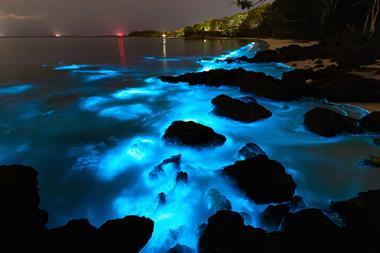Iraq's natural environment is in a dire state, but the security situation is seriously hampering the clean-up operation, as Simon Hadlington reports
Iraq’s natural environment is in a dire state, but the security situation is seriously hampering the clean-up operation, as Simon Hadlington reports
Iraq’s natural environment remains neglected and its condition is deteriorating as the country continues to struggle for political stability following the toppling of Saddam Hussein in the spring of 2003. Creaking infrastructure, politically motivated and deliberate damage to the environment and the inevitable fall-out from armed conflict have left the country with a legacy of accumulated toxic waste, threats to drinking water, poor air quality, and degrading natural habitats.
The situation has been described variously as challenging, alarming and a crime against the environment. The question is: who will clean up Iraq? And, perhaps more pertinently: when will it happen?
Chemical catastrophe
The United Nations Environment Programme (UNEP) has carried out two extensive reviews of the environmental problems facing Iraq. It has identified a number of environmental hotspots that require urgent attention, as well as broader issues such as sanitation and waste management (see box). Despite having a reasonably accurate inventory of the problems facing the country, frustratingly little can currently be done.
Pekka Haavisto, chairman of the UNEP Iraq taskforce, is alarmed by the state of the environment in the country, but as he told Chemistry World, security problems are seriously hampering the clean-up operation. ’For the hotspots that we have identified we know the risk states, we know the amount of contamination involved, and we know the kind of chemicals. We cannot move because of the security situation. It is very, very difficult in these circumstances because some of the clean-up techniques needed are highly specialised, requiring international teams and equipment. Around 80 to 90 per cent of project budgets go on security.’
He says that in spring last year it seemed to be getting safer. They thought they might be able to move in, particularly in the south of the country around the Basra region. ’But things took off again and you quickly become a target. The analyses simply cannot be done while the security situation is as it is.’
The security problems are not confined to foreign teams. ’Even Iraqi nationals working for the government are targets, both from insurgents and from criminals,’ Haavisto says. ’Kidnapping remains a serious problem. One ministry official was kidnapped recently and released only after a large ransom had been paid. There are still a number of no-go areas.’
While it remains too dangerous to start sampling and decontamination, UNEP remains in dialogue with Iraq’s new environment ministry and is working with the International Atomic Energy Agency to train Iraqi personnel in techniques for sampling and assessing radioactive contamination.
Slow and bureaucratic
’We moved into the country immediately after the political changes in the spring of 2003, but we were not so much welcomed by the coalition,’ Haavisto says. He says the coalition found them too slow and bureaucratic. ’But step by step the coalition realised that the problems are very complex and that they needed help. When power was transferred back to the Iraqi people they asked for UNEP involvement as quickly as possible.’
Haavisto likens Iraq to many of the countries of the old Eastern block; industrialised nations but with neglected and decaying infrastructure. ’In many ways this leads to greater environmental problems than in developing countries,’ he says. UNEP has listed the worst sites, but says the information it is getting from the regions is that there are many more.
Raising environmental awareness
Meanwhile, Ali Abdul Kariem M Ali, an Iraqi national who studied for a PhD at Cardiff University, UK, in pollution-related science, has established an organisation called the Environmental Protection Society of Iraq, to raise awareness about the environmental plight of his country.
Ali is scathing about the environmental legacy that Hussein left behind. ’If Saddam’s first crime was against his fellow countrymen, his second was against the environment,’ he says. Ali cites the draining of the marshlands as one of these crimes, but equally the fact that Hussein’s regime wilfully neglected vital infrastructure in many parts of the country.
One of the first priorities, Ali says, is to clean up contamination caused by the use of depleted uranium. ’This is a big issue and a big danger,’ he says. ’During the 1991 war, the depleted uranium was localised around the border region with Kuwait, but during the last conflict it was deployed much more widely across the country. Destroyed vehicles and other objects contaminated with depleted uranium are being used for scrap and are finding their way out of the country. There is also a big problem with unexploded munitions scattered around.’
UNEP is assessing potential contamination caused by the use of depleted uranium shells. British Challenger tanks released 1.9 tonnes of depleted uranium munitions in the 2003 action but the quantity used by US forces is not known. The effects of depleted uranium on the environment and on people’s health remains uncertain.
Resources needed
Ali believes that the nascent environment ministry needs help with environmental management and requires resources. ’There is good expertise within the universities, but they are poorly equipped,’ he says.
Iraq is facing an environmental disaster,’ says Ali. ’The west could be doing more, but ultimately it was down to Saddam, who was responsible for the poor state of the infrastructure, the sanctions, the invasions and the destruction of the environment in pursuit of his political aims.’
Water, soil and air
Abbas Hamid Sulaymon is head of the environmental engineering department at Baghdad University. He cites the main environmental problems in Iraq as being water, air, and soil pollution. ’Most of the factories, all the refineries and the electrical power plants in Iraq have their own wastewater treatment plants,’ Sulaymon says. ’Air pollution is controlled by using equipment such as electrostatic precipitators, cyclones or filter bags. In most of these plants the wastewater treatment and air pollution control systems are either not working (with wastewater discharging into rivers) or working at 50 per cent of their efficiency due to a lack of the treatment chemicals and spare parts, which Iraq suffered during years of wars and the United Nations sanctions.’
These factors have also had an impact on the treatment of drinking water, Sulaymon says, with treatment plants operating at around 60 per cent efficiency. The majority of cars on the road are more than 15 years old, and contribute to the poor quality of the air.
Sulaymon believes that the coalition countries are not doing enough to help solve the environmental problems, but accepts that this is due to security problems. His own department is producing graduates and postgraduates with expertise in assessing and tackling pollution, but the department lacks equipment and materials, and has problems training staff.
Environment ministry
One promising development is the establishment of the dedicated environment ministry which has around 1000 staff. During Hussein’s regime, the health ministry had responsibility for the environment. However, while the country remains in political turmoil it seems unlikely that the new ministry will be able to make a significant impact on Iraq’s environment in the short term.
One official demonstrates a distinct lack of faith in his superiors, complaining that the minister is a mathematician rather than an environmentalist, that senior directors in the ministry are similarly poorly qualified, and that there is an absence of real purpose in the organisation. ’Any idea put forward will be buried in one way or another - they simply say "we have no money" and they convince the minister,’ he told Chemistry World.
But a civil servant’s disillusionment with his ministers and superiors is nothing exceptional, so perhaps the new ministry is the real thing after all.
Simon Hadlington is a science writer based in York, UK
Contaminated sites
The United Nations Environment Programme (UNEP) has identified a number of contaminated industrial sites, including:
- The Al-Mishraq Sulphur State Company, located 30km south of Mosul. The company mines sulfur and has a sulfuric acid and aluminium sulfate plant.
In June 2003 the facility was reported to be on fire, emitting a huge plume of unidentified gas (presumed to be a mixture of sulfate aerosols, sulfuric acid and other oxidised sulfur compounds).
Local experts estimate that in the region of 0.5 million tonnes of sulfur was lost during the month that the fire burned, affecting a wide area and possibly polluting the Tigris river. The local population suffered respiratory problems, and more than 40 per cent of trees within a 100km radius of the plant were reported to have lost their leaves.
- The Al Qa Qaa complex, measuring about 400km2 and located 35km south of Baghdad. This complex has been used for decades to manufacture solid propellants, explosives and munitions, as well as raw materials such as nitric acid, sulfuric acid, sulfonic acid and solvents. Emissions of nitric oxides, sulfur oxides, solvents, acid aerosols and particulates could have contaminated the soil.
The complex was attacked or received collateral damage during the 2003 conflict and also in the 1991 Gulf war. During and after the conflict, deliberate spillages by looters are likely to have contaminated soil and possibly groundwater.
- Tuwaitha Nuclear Research Facility. This consists of a complex of more than 100 buildings on a 56km2 site 18km southeast of Baghdad and was the main site for the Iraqi nuclear programme.
While stocks of nuclear material were removed by the International Atomic Energy Agency more than a decade ago and all equipment destroyed, other radioactive materials, including uranium, remained in sealed barrels in the facility (left). Following extensive looting of the plant following the 2003 conflict, some 3000 barrels were reported stolen. People wanted the barrels (to use as water cisterns, for example) rather than their contents, which were dumped.
A survey by Greenpeace showed that in some areas, background radiation was 10 000 times higher than normal levels.
- Midland (Al Doura) Refinery Stores. The warehouses, 35km west of Baghdad, were one of the largest stores of chemicals in the country. During periods of extensive looting and ransacking more than 5000 tonnes of chemicals, including tetraethyl lead and furfural, were spilled, burned or stolen.
The area is assumed to be heavily contaminated with a variety of chemicals, and given the permeable nature of the sandy sub-soil, contamination of the groundwater is likely.
- In addition, UNEP says that other industrial activities, such as cement, fertiliser and pesticide production, are likely to have caused environmental damage either through their normal operation or if they were attacked during the conflict.
Oil fires and spills, many due to sabotage, have also caused extensive environmental damage. Waste management, water and sanitation have been severely neglected. Before the first Gulf war in 1991, Iraq had an
up-to-date and efficient water and sanitation system. However, subsequent international sanctions had a crippling effect on the sector, which was further compromised by the 2003 conflict.






No comments yet